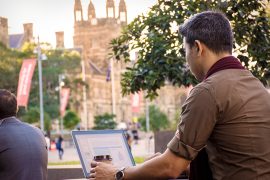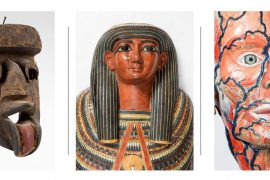The University’s 2032 Strategy has the aspirations of delivering a student-focused education which is transformational and which ensures that a greater diversity of students succeed at Sydney. The newly-endorsed Teaching and Learning Strategy 2023-2025 is designed to provide the foundational and essential initiatives to deliver these goals.
Background and consultation
The pandemic has greatly accelerated existing trends in teaching and in students’ approaches to learning and university. Even before 2020, attendance at traditional classes such as lectures was low and declining and our reliance on traditional assessments such as academic essays and high-stakes summative examinations was not delivering the kinds of skills and problem solving needed by employers, whilst leading to high staff workloads. The introduction of generative AI tools is already providing an even greater shake up of the skills needed by our students in the 21st century whilst further highlighting the limitations of our present approaches. Our data, as for other universities, has shown that students are finding it difficult post-pandemic to connect with their studies and with each other, and that technologies such as generative AI may lead to more transactional approaches to learning and widening of equity and access gaps. Intentional redesign of our teaching, learning and assessment is urgently needed.
The Teaching and Learning Strategy sets the vision for the University to offer a transformative education to all students. The Strategy was developed during 2022 through extensive consultation with faculties and students, and endorsed in May 2023 by the University Executive Education Committee as the cornerstone of the DVC(E) three-year roadmap:
- Arts and Social Sciences (6th and 12th September 2022)
- Science (8th September 2022)
- Law School (19th September 2022)
- Medicine and Health (20th September 2022)
- Engineering (20th September 2022)
- Business School (21st September 2022)
- Conservatorium of Music (23rd September 2022)
- Architecture and Design Planning (28th September 2022)
- Deputy Vice-Chancellor (Indigenous Strategy and Services (November and December 2022)
- 16 x 30-minute workshops were held with groups of students (September 2022).
The Strategy
The Strategy comprises six strategic initiatives based on the Principles Guiding Education at Sydney, is built on scholarship and world-wide best practice, and draws on the technologies, approaches and lessons from teaching over the last few years. The Strategy commits us to:
- Involve students as citizens of their own lifelong learning journey:
Our graduates will be motivated by a sense of civic responsibility and be ready to lead ethically throughout their lives. In the Australian context this includes and celebrates Aboriginal and Torres Strait Islanders cultures and knowledge systems and a mature understanding of contemporary issues. We acknowledge the importance of students’ autonomy and see them as partners in their learning. We will engage with them, fostering a culture of high expectations and resilience.
- Deliver effective blended learning experiences to maximise engagement and outcomes:
The in-person experience at Sydney is critical for student learning, self-efficacy and belonging, acknowledging the many Aboriginal Lands on which we teach and learn. We recognise that the contemporary student has significant lifeload and that university study is only a part of their lives. We will design purposeful learning environments which are flexible and deliver the best outcomes to allow all students to flourish, anytime and anywhere.
- Recognise, support and reward colleagues for student-centred teaching innovation:
Our teaching staff will be recognised through promotions, awards and fellowships in the same proportion as our research staff, and will operate in an environment where they are safe to innovate and experiment in an evidence-informed way. Criteria for recognition and reward will include excellence in teaching, educational leadership and innovation in their many forms across different contexts.
- Transform assessment and feedback practices:
Well-designed, authentic assessments and feedback are foundational for learning. We will design and deliver assessment that is aligned with transformational outcomes and qualities valued by disciplines, employers and the community, including academic integrity, to equip our graduates to be reflective, and culturally competent and ethical leaders.
- Use data and insights meaningfully to enhance student learning:
A strong data foundation will enable us to track our progress and discover effective teaching and support practices for our diverse cohorts of students. Going beyond dashboards, we will use data intentionally and critically, centering on how it can be used to support success, relationships, and engagement in teaching.
- Become an in-demand provider of dynamic lifelong learning:
We will build our capacity to deliver relevant and accessible short courses and micro-credentials that enhance internal and external partnerships. We will take an ‘online first’ approach to course development for all postgraduate professional programs, short courses and micro-credentials. Our curriculum and assessment at all stages will reflect and adapt to the changing nature of work and address real-world problems.
Implementation will move the University towards offering a world-class education and engage today’s students as citizens in their lifelong learning journey. To enable our educators and those who support them to change their practice, innovate in alignment with the Strategy and share best practice, resources are requested to fund targeted initiatives through a major education grant program.
Tell me more and what is next?
- Download the Strategy.
- With the Strategy now endorsed, funding is now being finalised for a major program of strategic education grants. It is expected that workshops and the application process will be launched at the start of Semester 2.






3 Comments